"I believe that the potential is huge. Not only do we have about 5 to 6 million people living in Athens alone, but we also import a lot of produce that eventually is brought to the islands, specifically during the summer season when there is a lot of demand from tourists. Every part of Greece grows different kinds of crops. However, most of the vegetables are imported, so this void could be filled up by growing locally, indoors," says Dafni Avgoustaki, a Postdoctoral Researcher at the Laboratory of Farm Structures at the Agricultural University of Athens.
Dafni is very glad to see that there's so much interest from other European universities in studying vertical farming. "Students are going crazy for vertical farming. We didn't even have the pilot ready yet, at the time, but many were thrilled to learn more. We presented the concept of vertical farming at the National Expo of Greece (Agrotica) alongside another 30.000 people. There is just a lot of research work for the Academics to work on."
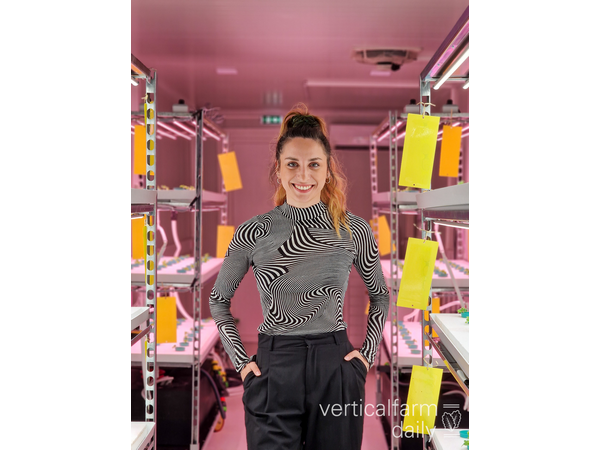
Dafni Avgoustaki
Nationally funded project
The project VF2FARM, funded by the national ESPA funding in 2020 call 'Investigate, innovate and create', Dafni and her team were able to start research in mid-2021. As the project finishes in December 2023, Dafni is looking for more funding to introduce vertical farming on an academic level and to the masses. Yet, as Dafni shares, new proposals are in the pipeline to optimize the current vertical farm that's placed at the University of Agriculture in Athens in terms of energy use efficiency optimization and support by renewable energy systems.
"We want an autonomous integrated vertical farm that works on integrated energy sources, such as solar panels and batteries. We'd like to better understand the energy peaks and rates, link that together and find the best times to save on costs. That will allow us to create a modular product that can be constructed anywhere," Dafni explains.
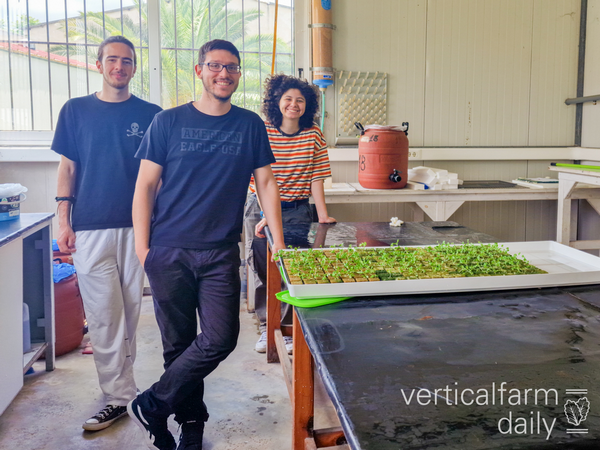
Dafni's students
Pilot farm
Together with the construction company Emmanouilidis, Dafni put together the facility inside a 40ft space, from lights to HVAC and irrigation is all done in-house.
Trialing with Valerianella locusta a Latin variety of lettuce that has shown great outcomes thus far. Testing the growing parameters such as lighting and irrigation, Dafni has been able to test quite some variables yet.
In order to make it more green and fully autonomous, we need more cash flow. We have about 15 students on the waiting list that are waiting to experiment with different protocols. Then there are two bachelor theses about to set off, three ongoing bachelor theses, two master theses and 2 Ph.D. theses as well. Additionally, there are students researching cashflow analyses, literature research, retail analyses, Life Cycle Thinking and environmental performance of the farms and in comparison with other farming systems (greenhouses and open fields).
Dafni's department is also collaborating with Dutch company Astroplant to better optimize their chamber inside the lab. "We are in charge of testing and optimizing the system to eventually provide a well-working and scientifically-based growing protocol for the users of the system all over the world."
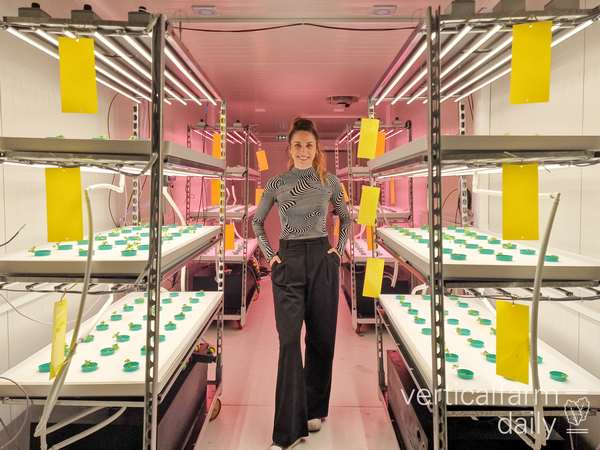
Optimizing energy demand through algorithms
On top of her involvement at the University, Dafni is running a company on the side as well, which is named VerdeCube. "It has a double storyline. For the Europeans of the Nordic and Baltic countries, VerdeCube is a software and optimization algorithm that optimizes energy demand and the efficiency of the farm. The software provides load-shifted energy demand responses. In the Northern countries, we have power exchange systems, of which the hourly exchange volumes are mainly produced by renewables."
According to Dafni, there is a huge flexibility in pricing that is based on the sales per hour. In her Ph.D., she developed a forecasting model for energy consumption, getting to know the peaks and lows of the prices. On top of that, she has developed a growth model of different plant crops and their demand in terms of lighting, which are synchronized to the forecasting model. In this way, Dafni is able to provide an intermitted load-shifted demand and optimize the environmental footprint of a vertical farm in order to provide the maximum possible yield with the lowest possible energy cost at the same time.
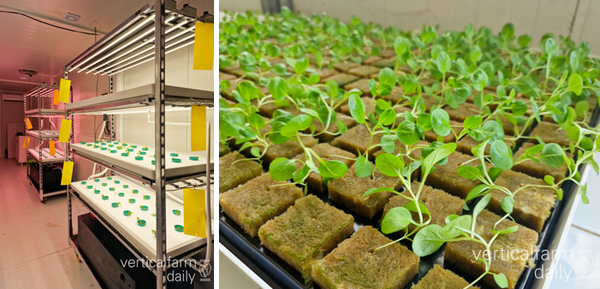
Customized vertical farms and business models
Currently, Dafni is working on increasing the database libraries by adding more crops that farms usually grow so the forecasting model can become more extensive as well. Thus far, the team has tested basil, mint, cherry tomatoes, 'regular' tomatoes, Valerianella, lettuce and strawberries.
Besides delivering optimization models for vertical farms, Dafni designs vertical farms from scratch on request. From the very small ones to larger ones, with a customized business plan coming with it based on the customers' needs. "You have to be able to talk in numbers and communicate your business model well to investors and the public. Depending on the volume and the cultivated crop, I'll help customers on how much a farm has to produce in order to reduce the investment payback period."

VerdeCube's concept of connecting vertical farms to renewables
Optimization is the core of Dafni's efforts in vertical farming. She is always looking at how to create synergies between certain projects. At this moment she is looking into excessive heat from greenhouses that can be used for vertical farms as well. However, it's not as easy as it seems, she points out.
"In Greece, people are purchasing affordable products, meaning regular fruits and vegetables. Premium products are mainly available in delicacy markets or in the HoReCa. For now, vertical farming would be perfect for these markets as the masses don't have too much money to spend on premium products at this point." In the future, Dafni would like to sell growing cabinets to the catering industry and concept stores to educate the public about vertical farming and the crops they allow to grow.
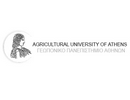 For more information:
For more information:
Dafni Avgoustaki, Postdoctoral Researcher of Farm Structures
Agricultural University of Athens
dafni_av@aua.gr / dafni.avgoustaki@gmail.com
www2.aua.gr/en
